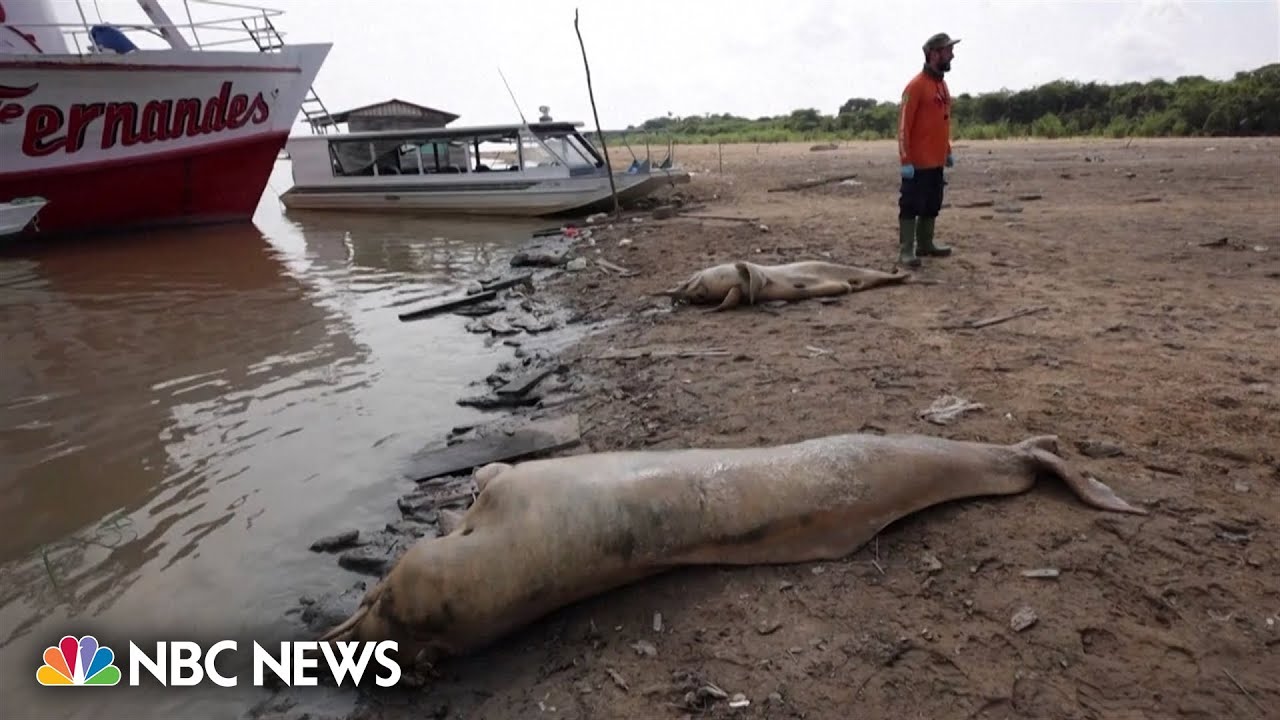Summary:
1. Over 100 dolphins were found dead in the Brazilian Amazon rainforest due to a drought.
2. Rising water temperatures are believed to cause their deaths.
3. Distressing images from the Amazon show the remains of the dolphins.
4. Scientists are studying the impact of climate change on wildlife in the region.
5. The unique ecosystem of the Amazon rainforest and its diverse wildlife.
The Amazon rainforest is known for its lush greenery, vibrant biodiversity, and unique wildlife. However, recent reports have brought to light a tragic incident that has shocked scientists and environmentalists alike. More than 100 dolphins were found dead in the Brazilian Amazon, a heartbreaking consequence of the ongoing drought in the region. The distressing images captured the remains of these majestic mammals, leaving experts concerned about the impact of climate change on wildlife.
The primary reason behind the dolphins’ deaths appears to be the rising water temperatures in the Amazon. As the drought worsened and the river levels decreased, the water became warmer, creating unfavorable conditions for these marine creatures. Dolphins are highly sensitive to their environmental surroundings; even small temperature variations can harm their well-being.
The lives of dolphins are intricately intertwined with the river ecosystem. They rely on their sharp echolocation skills to find food, communicate with each other, and navigate through the vast expanse of the Amazon. With the rising water temperatures, the fish population may have been negatively impacted, leading to food scarcity. This could have contributed to their weakened immune systems and increased their vulnerability to disease and death.
The Amazon rainforest is home to diverse species, including not only dolphins, jaguars, and jaguars countless other unique creatures. This ecosystem’s delicate balance is crucial for its inhabitants’ survival. Scientists are now focusing on the long-term effects of climate change on the Amazon’s wildlife. They aim to better understand the specific threats different species face and develop strategies to mitigate the impact of global warming.
The loss of over 100 dolphins is a devastating reminder of the urgency to take action to protect our natural habitats. Climate change is a global issue that requires collective effort and a commitment to sustainable practices. It is not only the responsibility of governments and organizations but also individuals to make conscious choices that reduce their carbon footprint and promote environmental conservation.
While the images from Brazil’s Amazon rainforest are undeniably distressing, they also serve as a powerful reminder of the beauty and fragility of our planet’s ecosystems. The Amazon rainforest is a treasure trove of biodiversity, and every species has a crucial role in maintaining its equilibrium. The loss of even a single species can have far-reaching consequences, disrupting the intricate web of life that sustains the rainforest.
However, it is important to remember that there is still hope. By increasing awareness, supporting scientific research, and implementing sustainable practices, we can positively impact our planet’s future. Governments and international organizations must prioritize preserving natural habitats and investing in renewable energy sources that reduce greenhouse gas emissions.
In conclusion, the tragic deaths of over 100 dolphins in the Brazilian Amazon due to rising water temperatures serve as a heartbreaking reminder of the immediate need to address climate change. The Amazon rainforest, with its unique ecosystem and abundant wildlife, is a treasure that must be protected. Every individual has a role to play in preserving our planet’s biodiversity, and by taking action now, we can ensure a brighter future for humans and the remarkable creatures that call the Amazon rainforest home. Let us not wait for more distressing images to awaken our conscience; instead, let us act now to protect our natural wonders for future generations.
Source Description
Distressing images from Brazil’s Amazon rainforest showed the remains of some 100 dolphins that had died from a drought. Scientists believe rising water temperatures are to blame.
» Subscribe to NBC News: http://nbcnews.to/SubscribeToNBC
» Watch more NBC video: http://bit.ly/MoreNBCNews
NBC News Digital is a collection of innovative and powerful news brands that deliver compelling, diverse and engaging, engaging NBC News Digital features NBCNews.com, MSNBC.com, TODAY.com, Nightly News, Meet the Press, Dateline, and the existing apps and digital extensions of these respective properties. We deliver the best-breaking news, live video coverage, original journalism and segments from your favorite NBC News Shows.
Connect with NBC News Online!
NBC News App: https://smart.link/5d0cd9df61b80
Breaking News Alerts: https://link.nbcnews.com/join/5cj/breaking-news-signup?cid=sm_npd_nn_yt_bn-clip_190621
Visit NBCNews.Com: http://nbcnews.to/ReadNBC
Find NBC News on Facebook: http://nbcnews.to/LikeNBC
Follow NBC News on Twitter: http://nbcnews.to/FollowNBC
Get more of NBC News delivered to your inbox: nbcnews.com/newsletters
#Dolphins #AmazonRainforest #Drought

